This month in PopCulture25YL, we’re taking a look at the music, shows, video games, and whatever else we want from the month that was August of 1994.
VHS In The VCR
This month, James Lipton’s Bravo series Inside the Actors Studio began its thorough and extensive series of interviews 25 years ago this month (with a theme song composed by Angelo Badalamenti, no less).
Fox’s M.A.N.T.I.S. also debuted but was about fifteen years too early for the kind of ambitious time-bending superhero stories it was trying to tell. Hence it was relegated to the doomed Friday night time slot before X-Files that doomed Adventures of Briscoe County Jr. the year before.
But we’re not going to write about either of those shows because there was another show debuting this month. It would only last through its single season before being cancelled, but we’re still talking about to this day:
My So-Called Life by Natasha B.C. Smith
In 1994 I was a 9-year-old child living in North East England. I have a very specific memory of watching My So-Called Life while playing with a set of Kitty in My Pocket toys, positioning them in their official Kitty Beauty Salon Playset. To my 9-year-old eyes, My So-Called Life always seemed so dark; watching it was like getting a glimpse into an illicit world that I was too young to be involved in. Of course, that was part of why I loved it. It did deal with some serious themes—Rayanne’s (A.J. Langer) substance abuse, the homophobia that Rickie (Wilson Cruz) faced, even teen homelessness—but when doing so it always kept the focus on character, rather than on plot and drama just for the sake of it. The show had a strong heart and soul, which has kept it a critical and fan favorite for all these years, despite it being cancelled after only one season.
When watching it now, My So-Called Life certainly evokes a particular time and place. I was only vaguely aware of the grunge movement that had enraptured teens thousands of miles away in the United States. Still, watching Angela Chase (Claire Danes) put on a flannel shirt and hang out with Jordan Catalano’s (Jared Leto) band conjures up memories of an elusive world that I was never really part of, but on some level wished I could be. There were many relatable elements in the show, from Angela figuring out her identity to Brian (Devon Gummersall) struggling to find a place where he could fit in, as well as the widespread heartbreak and unrequited love that is familiar to teens everywhere.
My So-Called Life was packed with talent, from the fantastic acting of Langer, Cruz and Gummersall to the star power of now household names Danes and Leto. Creator Winnie Holzman went on to write the book for the musical Wicked, while writer Jason Katims created the TV shows Roswell and Parenthood, as well as serving as showrunner on the popular Friday Night Lights.
Always influential, My So-Called Life has even spawned a term to describe a micro-generation comprised of the youngest Gen Xers and the oldest Millennials, Generation Catalano. I’m technically too young to be included, but I can definitely relate to the experience it refers to. Generation Catalano broadly describes those of us who spent our entire childhoods in a pre-Internet, pre-digital world, but who have never experienced adulthood without a widespread prevalence of cell phones, Wi-Fi, and MP3s.
If you’re in the mood for some mid-’90s, late-grunge, pre-smartphone nostalgia, or if you simply want a great, classic show to watch, hunt down My So-Called Life—you won’t be disappointed.
And, if you’d like to read more about My So Called Life, Cheryl Lee Latter wrote about it here for our Cancelled Too Soon series.
CDs On Rotation In Our Six-Disk
The Toadies- Rubberneck by John Bernardy
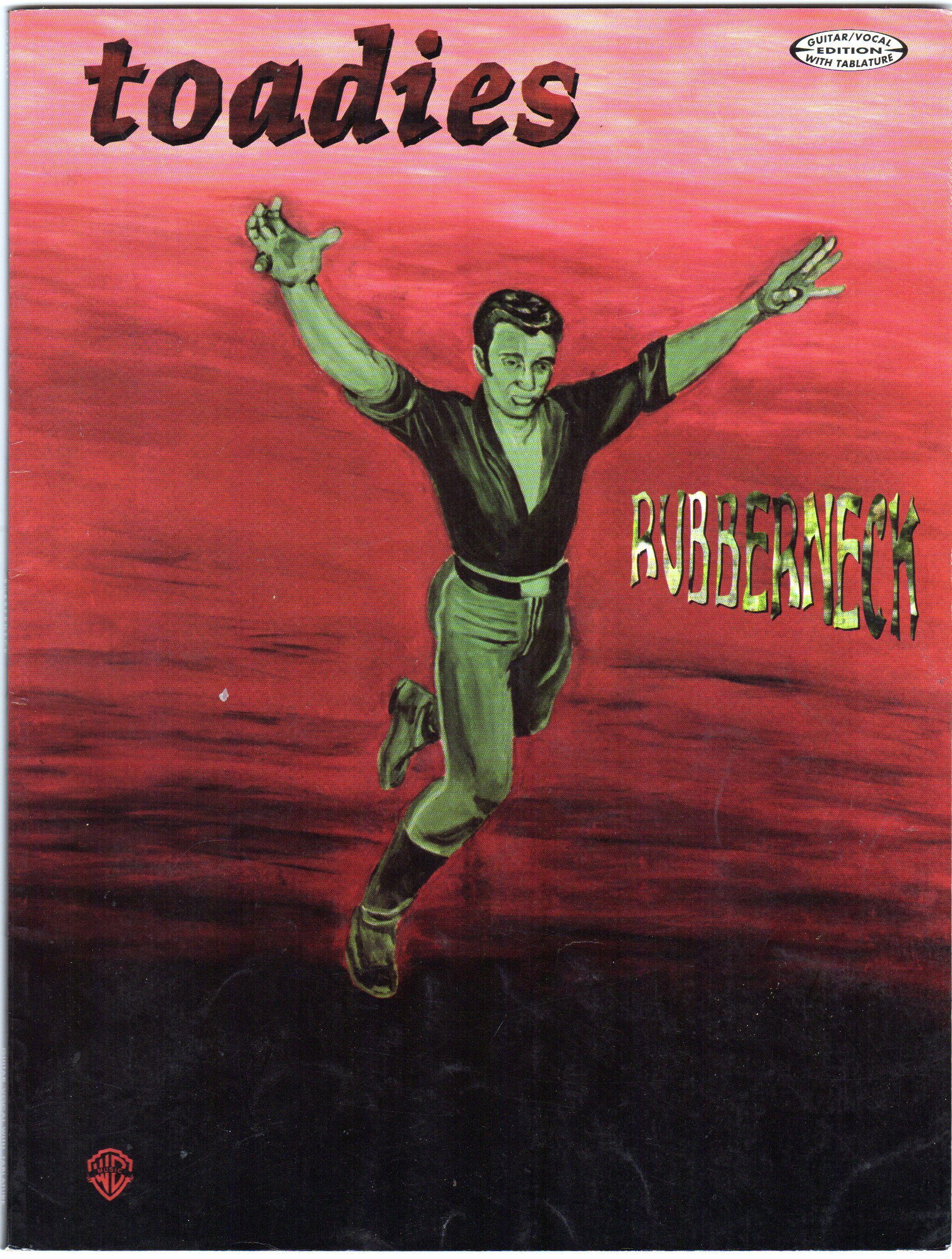
I get the distinct impression that this album wants to start a fight. It feels like there’s a main character in this album that is a rough and tumble brawler that really wants to fall in love but he has absolutely no idea what that means or how to do it. But he’s going to rock out the whole way.
The Toadies were big for me. The thing that pissed me off most about their talent is that Vaden Todd Lewis’ lead vocals are two notes higher than my range. I couldn’t cover any of their music without cracking some important—and majorly conspicuous—high notes. Killed me. Still kills me, if I’m being honest. This album is fun to rock out to, still.
I met this album right after it was released. Not understanding how to find or be in love matched well with my teenage self, and the musicianship was top notch. Lisa Umberger’s bass alone was fantastic and laid the groundwork for how I used the instrument a decade later. Darrel Herbert’s lead guitars were the proper balance between chaotic and in the pocket.
Who is the main character I hear in Rubberneck? Well, the album starts with an instrumental preamble to an ass kicking called “Mexican Hairless” so I begin by imagining an aggressive Chihuahua. The next song, “Mr. Love”, repeats this sentiment at various volume levels: “Are you gonna save me, you gonna make me happy, tell me mister love.” These first two songs feel like a statement of intent before the first real song on the album, “Backslider.” And that one seems like someone who really doesn’t know what they’re doing. The whole album feels like a shifting feral creature trying to figure out how to love.
“Possum Kingdom” comes next, and is the band’s biggest hit, for a lot of reasons. It’s slinky and sexy but it’s also dark and almost comical sometimes. It also screws regularly with time signatures. The song has an interesting tone you don’t usually get in music, especially the kind that makes it to the radio and has success.
It’s followed up by “Quitter”, the most Nirvana that Nirvana never recorded, then by “Away,” the radio hit I liked even more at the time than “Possum Kingdom.” Then we have what’s probably my true favorite song on the album: the three-four time stomper “I Come From the Water”.
Then the band shifts gears into yet another style with “Tyler,” which as far as I’m concerned is a Pixies song and you can’t tell me otherwise. The Toadies can chameleon with the best of them whenever they want to, while still maintaining their own identity. That’s part of why I feel this album has a main character trying to find his way.
“Happyface” and “Velvet” fall into that same style category as “Backslider,” and they’re good but hard to quantify when you’re not listening to them. And then the album closes out with “I Burn.” It’s a dark dramatic ending, and kicks all kinds of ass without containing any of the rest of the album’s playfulness. It feels like a statement of knowing he’s not capable of finding love so he’ll fester over here. I wouldn’t go so far to say it’s personified toxic masculinity, but it’s not entirely dissimilar. Not sure the state of mind of the band on this one, but I missed that level of darkness anyway, instead substituted a heaping portion of teenage angst. Which works so much better. “I Burn” is a rough place to end if it really is a loose narrative, but man do I love the slow-build songs and I’m not going to pretend I didn’t steal its baseline for a song of my own.
Writing about Rubberneck here has been fairly enlightening; it didn’t feel like it was an all-time favorite back in 1994, but it really got there with me. Between the variety of styles, its playfulness and tone shifts, and its solid musicianship, this one’s a keeper.
Natural Born Killers Soundtrack by Jason Sheppard
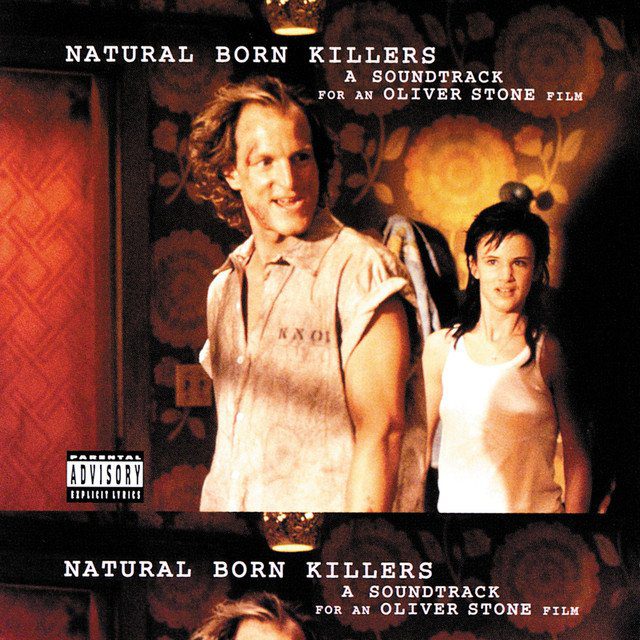
During the Summer of 1994, there were three movie soundtracks which defined that season: The Hans Zimmer, Elton John collaboration The Lion King (no doubt in part to the hit “Can You Feel The Love Tonight?”) and the double disc collected favorites of Forrest Gump. The third: The Natural Born Killers soundtrack.
According to Natural Born Killers producer Jane Hamsher in her book Killer Instinct: How Two Young Producers Took on Hollywood and Made the Most Controversial Film of the Decade, initially, the production had only licensed eight songs to use for the movie. By the time shooting was completed and editing was deep underway, the finished movie contained a whopping 130 pieces of music!
Unless the label, Interscope was going to release a ten disc set (which they weren’t), this meant only a select few of those pieces could be chosen for the soundtrack. Then a funny thing happened once the movie was completed: Interscope incorporated artists with no connection to the movie’s production to assemble the album. Trent Reznor of The Nine Inch Nails was tasked with producing the disc where he then included his own material (“Burn”). Then, the label wanted other artists they represented included such as Snoop Dogg (“What Would You Do?”) and Dr. Dre (“The Day The Niggaz Took Over).”
Reznor (who watched the movie over 50 times to get into the mind of it), produced an album every bit as wild as NBK itself.
The soundtrack, like the movie, opens with a shortened version of Leonard Cohen’s “Waiting For the Miracle” which was only a year and a year-and-a-half old at the time of release (Hamsher passed a copy to Stone during production to help calm him down).
With that, the album lurches into L7’s fierce and savage “Shitlist” which is the tune played when Juliette Lewis beats the life out of two lecherous creeps in the movie’s opening scene.
The rare Bob Dylan tune “You Belong To Me” is worth owning the album alone but ultimately, includes film dialogue during the closing instrumentals. Thankfully presented dialogue free is Patsy Cline’s “Back In Baby’s Arms” – the album’s most upbeat tracks.
Featured on the album are a few tracks incorporating the hauntingly voice of Nusrat Fatheh Ali Khan – on “Taboo” (which also includes percussion arrangements by Peter Gabriel). This track is reminiscent of their The Last Temptation of Christ work. This track goes right into the Jane’s Addiction track “Sex Is Violent” featuring vocalist Diamanda Galás.
Reznor, talented as he is, made the mistake of adding too many movie dialogue tracks including “Route 666”, “Totally Hot,” Juliette Lewis’s “Born Bad” and “Botanga in Botangaville” which is film dialogue of a news anchor reacting to the prison riot carnage broadcast over the air. I would have liked to see these left off in favor of having Robert Gordon’s “The Way I Walk”, the hillbilly riff played during the movie’s early diner scene. Another glaring omission is The Cowboy Junkies’ “If You Were the Woman and I Was the Man” which is featured over Mickey and Mallory’s bridge wedding. Their beautiful song “Sweet Jane” is included on the album though.
According to Hamsher, the dialogue insertions where included because the same thing was present in the Reservoir Dogs soundtrack two years earlier, although I don’t think the dialogue bits were dubbed over the songs on that release.
The NBK soundtrack did very well upon release and was the 19th best selling album of 1994. This was even without the inclusion of tracks by Rage Against the Machine and Marilyn Manson.
We may never know what a Hamsher produced NBK soundtrack would sound like but we have this Reznor one which is now 25 years old. Mickey Knox always believed “The whole world is coming to an end,” and the Natural Born Killers album is the soundtrack for it.
Orbital- Snivilisation by John Bernardy
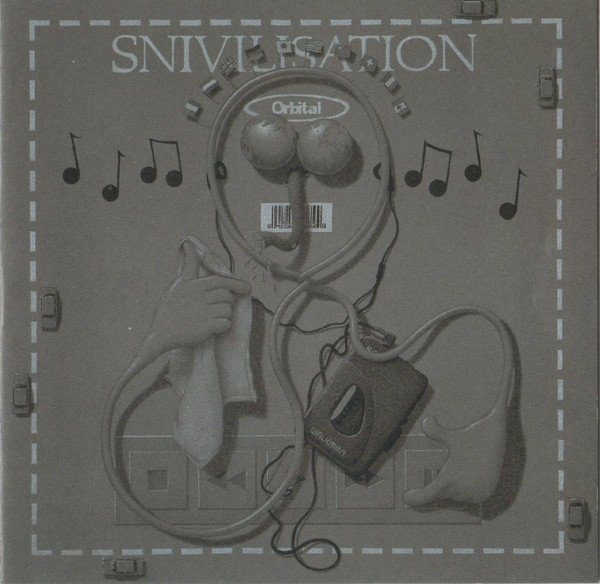
I fell had for Orbital when I heard “Adnan” on The Help Album which will be released the following Summer of 1995. I bought that album for Portishead’s “Mourning Air,” but Orbital was the biggest revelation by far. The first thing I did was find as many of the band’s albums as I could find. Which, living in America, meant there was only one (of three) readily available: Snivilisation. This was Orbital’s third album, and it wasn’t quite what “Adnan” led me to expect, nor was it the epic constant presence in my collection that their next album, In Sides, became, but this is a solid experiment that introduced me to the world of Electronica.
Orbital made rave music, not that I had any idea what that meant at the time, They have a pleasant sound compared to the industrial scene of the day, and it made me feel like I was listening to Nintendo games. But rather than sounding like something Konami put out for the Super NES, Orbital used chimes and piano keyboard sounds to couple with more prevalent buzzing sounds.
Throughout the album are a number of sound clips that tell a story of opposing philosophies, and it seems to be an album that wants to say “can’t we all just get along?”
The first track, “Forever,” has samples of a political speech and the next track, “I Wish I Had Duck Feet” had samples of a barker at a circus freak show, while the music behind it was the exact middle between ambient music and Vince DiCola’s fantastic score for Transformers; The Movie.
“Sad But True” gets much more sour and choppy, including cut up vocals from Alison Goldfrapp. Then “Crash and Carry” and “Science Friction” follow, seeming like more traditional rave songs. Then the album’s story kicks in again with “Philosophy By Numbers,” where a man talks about life, existence and wisdom, while a woman talks about technology with flexible payment options, and why not find out more? She gets the final word, so perhaps technology won the final argument this round?
“Kein Trink Wasser” goes back to Happiest Vince DiCola mode, then “Quality Seconds” is a go, go, go mentality for its entire minute and a half length. Then the album starts to sound like the Orbital I know best.
“Are We Here?” is a 15-minute track that brings back Goldfrapp and has a male asking “Are we here, are we unique, what does God say?” and then the song meditates on that question and takes us on a journey. The final track, “Attached,” seems to be a similar meditation, but it seems to be an answer to the question posed throughout the album. Orbital seems to think both sides can get along, and they’re attached in the center.
I could do without about half the vocal samples in this album, but I do like that Orbital is trying to accomplish something here. It’s a little bigger in scope than their first two albums, and they’re exploring some good territory. And you can tell they’re learning what they can do when they open up their soundscapes here. There’s glimpses of their brilliance all over the place here. It just hasn’t quite come together quite as well as the arguing vocal samples quite yet. Give them two years, that’s all it’ll take.
Prince- Come by Abbie Sears
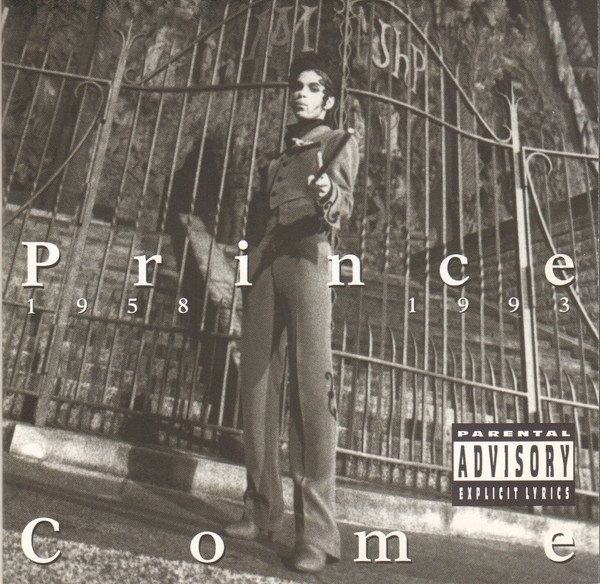
Despite not receiving any support from the man himself, Come was quite a significant album in Prince’s career. Being the last album released through Warner Bros under the name ‘Prince’ the album was left overlooked by those who didn’t know what they were looking for, or by those who refused to purchase from Warner Bros. after their relationship with Prince had deteriorated.
The tracks released on Come were put together from mainly ‘old’ music from Prince’s music vault. He used old content so that he could advertise his new music released elsewhere over the release of this album. It is unfortunate because this album has some really funky tracks.
The first three songs of the album, “Come,” “Space,” and “Pheremone” are great tracks that you expect to hear from Prince. They make up just over 20 minutes of imaginative sexual innuendos, and straight up pornography through music. We come back to this theme with “Orgasm” which seems to appear quite randomly at the end of the album. I understand that this track was a remainder of a track titled “Poem” that was separated and included as parts of other tracks. In between these songs things get rather experimental and somewhat uncomfortable when you pay attention to the lyrics, and it is made rather apparent that these particular tracks may have never been intended to come together in one album.
That being said, separately, they are quality tracks that I am so glad were released. It’s not guaranteed that we would have ever gotten to hear these if Prince hadn’t had to adhere to his ‘contractual obligation’ with Warner Bros. At least we can say that Come is one good thing that came out of the controversy, and we were handed this gem while Prince released new music under the unpronounceable name of a symbol. That’s twice as much Prince, and that’s exactly what we want.
Dinosaur Jr.- Without A Sound by John Bernardy
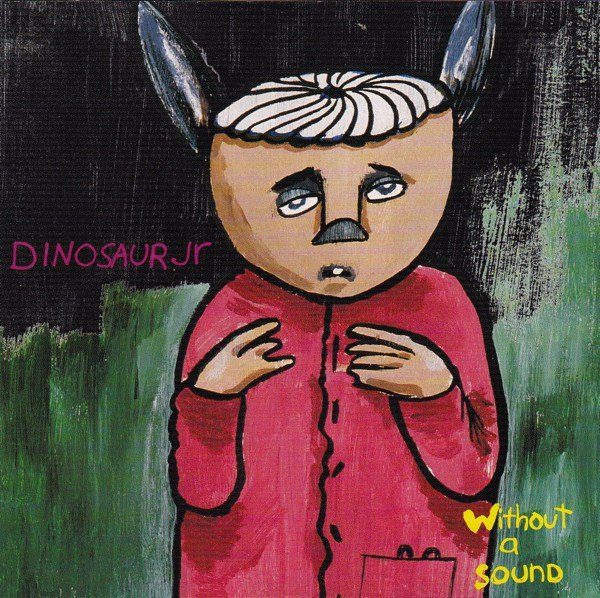
This was Dinosaur Jr.’s sixth—and most popular—album. You might recognize “Feel The Pain” from Guitar Hero World Tour or Rock Band 2, but that song was positively everywhere when I was first getting into music. It seemed overly simple but that guitar line in the verses will happily get in your head. I never did get into J. Mascis, but this song’s odd sense of catharsis will always make me smile and I hope it does the same for you.
Rusted Root- When I Woke by John Bernardy
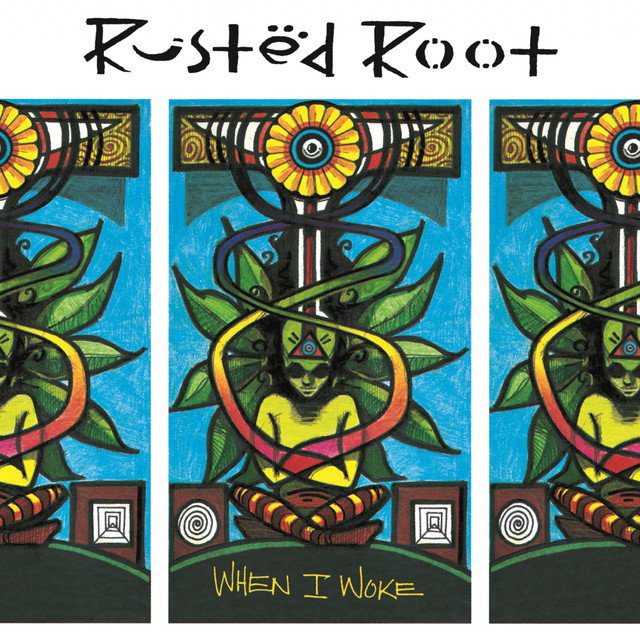 I always get nervous when American albums go full-on World Music like Paul Simon did on Graceland, but I think Rusted Root is actually the real deal. They’re all solid musicians, proven by the first track being populated by nothing but percussion, djembe and voices. Maybe it’s how energetic they are with so many instruments, but they give me an early Arcade Fire vibe. The album’s got a much more serious tone than I was expecting, but most of you will never hear it because this album is known for the positive smile-inducing unintelligible “Send Me On My Way,” complete with flute. Don’t get me wrong, I love that song, but this album has tons more depth to be discovered and I recommend you digging in to find it.
I always get nervous when American albums go full-on World Music like Paul Simon did on Graceland, but I think Rusted Root is actually the real deal. They’re all solid musicians, proven by the first track being populated by nothing but percussion, djembe and voices. Maybe it’s how energetic they are with so many instruments, but they give me an early Arcade Fire vibe. The album’s got a much more serious tone than I was expecting, but most of you will never hear it because this album is known for the positive smile-inducing unintelligible “Send Me On My Way,” complete with flute. Don’t get me wrong, I love that song, but this album has tons more depth to be discovered and I recommend you digging in to find it.
Luscious Jackson- Natural Ingredients
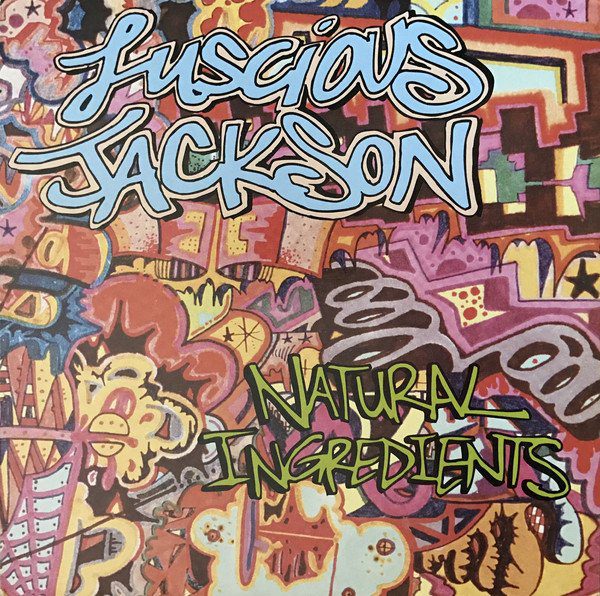
The debut album from Luscious Jackson doesn’t have their giant hit “Naked Eye”—that’d be their 1996 follow-up Fever In Fever Out—but all the ingredients for their sound is here in this album. It maintains a low key vibe but there’s a lot of energy and rhythm here. You’ll find lots of funk in the instrumentation, lots of clean lyrics and close harmonies in the vocals. If the album’s first track “Citysong” doesn’t make you feel a groove you’re just not human.
This is an album you can dance to or get a lot of writing done with. And it’s fun as hell. The ladies of Luscious Jackson are doing Ill Communication levels of funk while mostly leaving out the zaniness. I give a strong recommend to this one.
Dream Brother – 25 Years of Jeff Buckley’s Grace by Cheryl Lee Latter
David Bowie said it was his favourite album. Bob Dylan and Jimmy Page have extolled its brilliance.
At the time of writing, it is 25 years to the day since Jeff Buckley kicked off the Grace tour, introducing the groundbreaking album to the world.
The record was the first studio album for the young musician, whose poster boy good looks and powerful swooping vocals seemed to make success inevitable.
With its roots in acoustic jazzy ballads interspersed with screeching guitar rock sounds, Grace is made up of ten songs that are delicately balanced to spell out a story of love, loss and eternal longing.
The title track, “Grace,” the slow heavy “Mojo Pin,” and fan favourite “Lover, You Should Have Come Over” are the perfect showcases for the musician’s unique sound and extraordinary vocals. A voice that could leap from banshee shrieks to soulful whispers within the same breath.
Grace made a slow start, but soon became a critical success. Jeff and his band embarked on a long tour to promote the record, and it slowly crept its way into the charts. The quality shone through from the start, helped by radio-friendly single “Last Goodbye,” and several TV appearances that gave him the opportunity to showcase his unique voice in an acoustic setting.
Over the years, the album has continuously picked up new fans, mainly thanks to the success of “Hallelujah,” the Leonard Cohen cover that has eclipsed the original to be used endlessly in films and TV shows.
‘Don’t be like the one who made me so old. Don’t be like the one who left behind his name’ – Dream Brother
Jeff Buckley was haunted by comparisons to his famous father Tim, a father he never knew as anything more than a voice on a record, a voice often very similar to his own, and whom he only met once.
Raised as Scottie Moorhead in Orange County, he didn’t reinvent himself as Jeff Buckley until after his father’s death. Tim Buckley died in 1975 aged just 28. Far from building a career on his famous name, the young Jeff worked for many years as a guitarist and backing singer, making his own way and his own success.
Eventually, he arrived in New York as a singer-songwriter, playing cafes and bars and building a name for himself. His reputation earned him a recording contract and a band, and work began on forming Grace, his one completed studio album.
‘It’s never over. She’s a tear that hangs inside my soul forever’ – Lover, You Should Have Come Over
The Grace songs hint at hidden depths, doomed love, smoky New York bars and rainy mornings, but there was no sign of that in the real Jeff. He was sweet, goofy, fun, a sunny California boy with unruly hair and a beatnik spirit, a boy who carried his talent gently and humbly and without arrogance.
He sang of broken hearts, ghosts and eternal sadness, but in reality there was nothing to indicate he was racing towards an early death.
Work was underway on the second studio album, which was later released unfinished as Sketches for My Sweetheart The Drunk, when Jeff walked into the Mississippi River on May 29th, 1997 for an impromptu evening swim and never resurfaced.
Swept under by strong currents, his body was found days later. His death was ruled an accident with no suspicious circumstances. At 30, he had outlived his father by only 2 years.
‘I believe my time has come. It reminds me of the pain I might leave behind’ – Grace
Grace is an album steeped in death and funereal images. It is haunted by the ghosts of lost love and lost hope, and the bittersweet emptiness of goodbyes.
What we are left with is one perfect studio record, a handful of demos and live releases, and a beautiful energy, captured in time.

